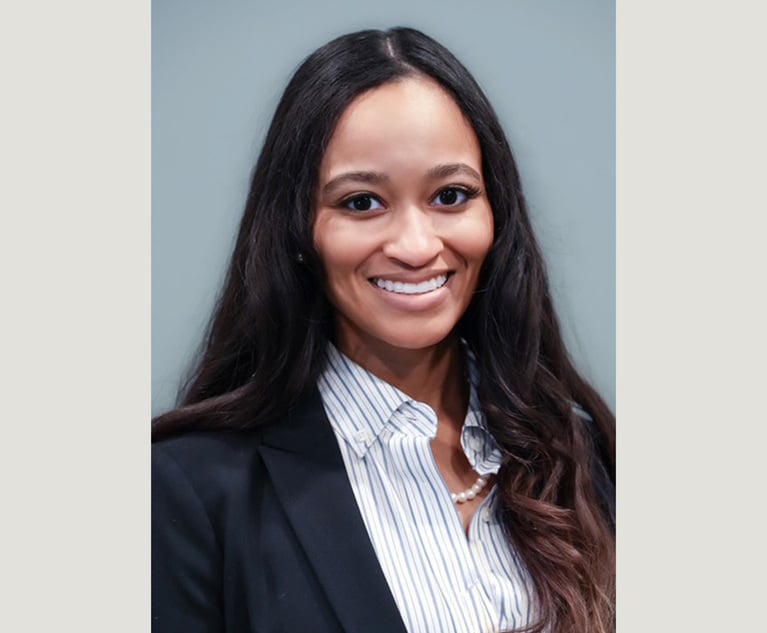 Philadelphia City Hall building. Photo: Diego M. Radzinschi/ALM
Philadelphia City Hall building. Photo: Diego M. Radzinschi/ALMJurisdictional Dispute in Wake of 'Bristol-Myers Squibb' Decision to Highlight SCOPA Argument Session
The high court is set to hear arguments in 12 cases during its two-day oral argument session in Philadelphia.
March 02, 2020 at 02:50 PM
5 minute read
Arguments over whether plaintiffs hailing from outside the Keystone State can sue out-of-state defendants in the wake of the U.S. Supreme Court's high-profile decision in Bristol-Myers Squibb v. Superior Court of California are set to highlight the Pennsylvania Supreme Court's argument session beginning March 10.
The high court is set to hear arguments in 12 cases during its two-day oral argument session in Philadelphia. The justices are scheduled to eye several topics, including employment law, criminal law and insurance litigation, but arguments over the jurisdictional issues raised in Bristol-Myers Squibb are likely to have the broadest impact for litigation in the state.
On March 10, the Supreme Court is set to hear arguments in Hammons v. Ethicon, which is a case out of Philadelphia's pelvic mesh mass tort that came to a $12.5 million award in 2015.
In a one-page order issued in April 2019, the justices granted defendant pelvic mesh maker Ethicon's appeal to consider a single issue: "Whether the due process clause of the Fourteenth Amendment to the United States Constitution and 42 Pa.C.S. Section 5322(c) precludes Pennsylvania from asserting personal jurisdiction over two New Jersey companies in a case brought by an Indiana resident asserting claims under the Indiana Product Liability Act."
The case presents the Supreme Court with its first opportunity to address the Bristol-Myers Squibb ruling, which made clear that out-of-state plaintiffs can't sue companies where the defendants aren't considered to be "at home," or haven't conducted business directly linked to the claimed injury. The ruling was hailed by the defense bar as "game-changing" and led to an immediate wave of venue challenges across the country.
Ethicon, which is a subsidiary of Johnson & Johnson, had contended that plaintiff Patricia Hammons' claims were not sufficiently connected to activities that happened in Pennsylvania to establish specific jurisdiction under Bristol-Myers, and so, since Hammons is an Indiana resident and Ethicon's principal place of business is New Jersey, Philadelphia did not have jurisdiction to handle the case.
However, Superior Court Judge Victor Stabile, who wrote the court's 82-page precedential decision, said, "The connection between Ethicon and Pennsylvania is considerably stronger than the connection between Bristol-Myers and California." Specifically, Stabile noted that Ethicon had worked with an Allentown doctor, as well as Bucks County, Pennsylvania-based Secant Medical, to develop the pelvic mesh that was at issue in Hammons' case.
A ruling by the Supreme Court could provide guidance on how strongly the underlying facts of a case need to be to establish jurisdiction in the state.
|Expert Opinions
Later on March 10, the justices are set to hear arguments that delve into the way trial courts are supposed to evaluate expert opinions in personal injury cases.
The last case set to be argued March 10 is Bourgeois v. Snow Time, which involves the appeal by a man who claims injuries he suffered while snow tubing were the result of negligence and recklessness on the part of the tube run operator.
Plaintiff Ray Bourgeois was seriously injured when his tube crossed paths with the rubber kitchen mats placed at the bottom of the tube run. He and his wife subsequently sued Snow Time and Ski Roundtop, alleging that they were reckless and grossly negligent in using rolled-up kitchen mats to help slow down riders at the bottom of the hill.
The plaintiffs submitted expert reports by Mark DiNola, an expert in the field of ski and snow tubing risk management, and Gordon Moskowitz, a mechanical and biomechanical engineering expert. But Judge Alice Beck Dubow, writing for the majority, said neither report specifically established that the defendants breached a standard of care by placing rubber mats at the bottom of the tube run.
The Supreme Court agreed to take up the case to address four separate issues, including whether the Superior Court's decision improperly required a violation of industry standards to sustain the recklessness or gross negligence claims, and whether the ruling conflicted with law "requiring it to review petitioners' expert reports in the light most favorable to the non-moving party by, inter alia, (a) improperly requiring petitioners' experts to establish the legal duty that respondents breached, (b) dismissing their opinions as conclusory, and (c) overlooking numerous opinions throughout their reports which supported petitioners' prima facie case against respondents?"
|Restrictive Covenant
On March 11, the justices are set to consider whether a restrictive covenant discussed, but not physically signed, prior to the start of work can be enforceable without an offer of additional consideration.
Arguments in Rullex v. Tel-Stream come after the Superior Court ruled that, under the those circumstances, the covenant cannot be enforced.
Plaintiff Rullex, a Pennsylvania company that provides telecommunications construction services, subcontracted work to defendant Tel-Stream, a company that provides labor crews to businesses that service cellular towers. It is not in dispute that Tel-Stream signed a "subcontractor non-disclosure, non-solicitation, and developments agreement" with Rullex months after it actually began performing work for Rullex. The agreement barred Tel-Stream from competing with Rullex, soliciting Rullex's customers within a nonsolicitation region, and misappropriating Rullex's trade secrets.
In February 2018, Rullex sued Tel-Stream in the Philadelphia Court of Common Pleas alleging Tel-Stream breached the restrictive covenant by contracting with Rullex's main competitor, Invertice.
The trial court ruled in favor of Tel-Stream and its owner, defendant Yuri Karnei, and rejected Rullex's petition for injunctive relief, finding that the noncompete was invalid because it was signed after the first day of employment. The Superior Court agreed with the lower court's ruling and affirmed.
This content has been archived. It is available through our partners, LexisNexis® and Bloomberg Law.
To view this content, please continue to their sites.
Not a Lexis Subscriber?
Subscribe Now
Not a Bloomberg Law Subscriber?
Subscribe Now
NOT FOR REPRINT
© 2024 ALM Global, LLC, All Rights Reserved. Request academic re-use from www.copyright.com. All other uses, submit a request to [email protected]. For more information visit Asset & Logo Licensing.
You Might Like
View All
Plaintiffs Seek Redo of First Trial Over Medical Device Plant's Emissions
4 minute read
Remembering Am Law 100 Firm Founder and 'Force of Nature' Stephen Cozen
5 minute read
Eckert Seamans Snags Reed Smith Global Financial Intelligence Director
3 minute read
Trending Stories
Who Got The Work
Michael G. Bongiorno, Andrew Scott Dulberg and Elizabeth E. Driscoll from Wilmer Cutler Pickering Hale and Dorr have stepped in to represent Symbotic Inc., an A.I.-enabled technology platform that focuses on increasing supply chain efficiency, and other defendants in a pending shareholder derivative lawsuit. The case, filed Oct. 2 in Massachusetts District Court by the Brown Law Firm on behalf of Stephen Austen, accuses certain officers and directors of misleading investors in regard to Symbotic's potential for margin growth by failing to disclose that the company was not equipped to timely deploy its systems or manage expenses through project delays. The case, assigned to U.S. District Judge Nathaniel M. Gorton, is 1:24-cv-12522, Austen v. Cohen et al.
Who Got The Work
Edmund Polubinski and Marie Killmond of Davis Polk & Wardwell have entered appearances for data platform software development company MongoDB and other defendants in a pending shareholder derivative lawsuit. The action, filed Oct. 7 in New York Southern District Court by the Brown Law Firm, accuses the company's directors and/or officers of falsely expressing confidence in the company’s restructuring of its sales incentive plan and downplaying the severity of decreases in its upfront commitments. The case is 1:24-cv-07594, Roy v. Ittycheria et al.
Who Got The Work
Amy O. Bruchs and Kurt F. Ellison of Michael Best & Friedrich have entered appearances for Epic Systems Corp. in a pending employment discrimination lawsuit. The suit was filed Sept. 7 in Wisconsin Western District Court by Levine Eisberner LLC and Siri & Glimstad on behalf of a project manager who claims that he was wrongfully terminated after applying for a religious exemption to the defendant's COVID-19 vaccine mandate. The case, assigned to U.S. Magistrate Judge Anita Marie Boor, is 3:24-cv-00630, Secker, Nathan v. Epic Systems Corporation.
Who Got The Work
David X. Sullivan, Thomas J. Finn and Gregory A. Hall from McCarter & English have entered appearances for Sunrun Installation Services in a pending civil rights lawsuit. The complaint was filed Sept. 4 in Connecticut District Court by attorney Robert M. Berke on behalf of former employee George Edward Steins, who was arrested and charged with employing an unregistered home improvement salesperson. The complaint alleges that had Sunrun informed the Connecticut Department of Consumer Protection that the plaintiff's employment had ended in 2017 and that he no longer held Sunrun's home improvement contractor license, he would not have been hit with charges, which were dismissed in May 2024. The case, assigned to U.S. District Judge Jeffrey A. Meyer, is 3:24-cv-01423, Steins v. Sunrun, Inc. et al.
Who Got The Work
Greenberg Traurig shareholder Joshua L. Raskin has entered an appearance for boohoo.com UK Ltd. in a pending patent infringement lawsuit. The suit, filed Sept. 3 in Texas Eastern District Court by Rozier Hardt McDonough on behalf of Alto Dynamics, asserts five patents related to an online shopping platform. The case, assigned to U.S. District Judge Rodney Gilstrap, is 2:24-cv-00719, Alto Dynamics, LLC v. boohoo.com UK Limited.
Featured Firms
Law Offices of Gary Martin Hays & Associates, P.C.
(470) 294-1674
Law Offices of Mark E. Salomone
(857) 444-6468
Smith & Hassler
(713) 739-1250





